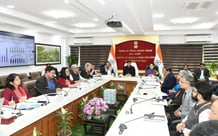Let us tell you a story. At a time of great strife, there was a king who ruled over a vast land. Nominally, he was democratically elected; however, in reality, he wanted undying loyalty from most of his subjects. They were happy to swear to that too, because they were willing to die for their religion, having found themselves unworthy of any other higher purpose. Those who did not agree with him were speedily silenced .
In such an expanse, when cultural warfare was de rigueur and rationality took a backseat to nationality, came an attack from a virus. It was a worldwide pandemic that the king and his subjects did their best to communalize at the outset. However, in the end, incompetence could not be hid behind intolerance. Very soon, his country was losing more people than any other, even ignoring persistent reports of undercounting .
Amazingly, even though previous private and public partnerships had made this land the largest vaccine producer in the world, the honorable leader managed to mess it all up having begun to believe his own hype that in his leadership the virus stood defeated. So that posterity may not fall for such ploys in the future, here is a ready reckoner of all the mishaps that contributed to this sorry story.
- Nationalism over science leading to vaccine hesitancy
Generally, every vaccine has three phases of trials before local authorities approve it for the general public. The approving authority must usually work independently of any political influence. However, when one vaccine from a far, foreign land was approved, the local vaccine had only completed two phase trials till that time. The indigenous product, though, was simultaneously approved . This smacked of political interference and the general public became wary.
The interim phase three results came a couple of months later, which is when the provisional approval ought to have been actually given. However, a sizeable portion of the citizenry was hesitant to get inoculated because of perceived preference towards national products in contravention of established scientific practices. Which was a shame for the country, as the local product showed better immunological efficiency than the foreign brand. Hubris ruined what could have been a giant win for the country’s scientific community.
The same mistake was then repeated by allowing the production of another vaccine while phase three bridging trial results were awaited. It was especially critical as questions were raised by local and foreign approving bodies. Nevertheless, with people drowning in despair and bodies floating in rivers, the situation had become so desperate that nobody batted an eyelid.
- Downplay the existing crisis leading to slow uptake
While the first step itself was fatal, the ruling class decided that it had more to contribute to the prevailing confusion. Multiple sycophants of the king proclaimed that, under his quasi-divine leadership, the feeble coronavirus lay wrecked. Election rallies and religious festivals were back in full flow and masks had outlasted their importance. Naturally, a public that saw the king as their deity accepted the dicta and accordingly calculated that if the virus had been defeated, it made scant sense to spend time and money to get vaccinated against it. Thus, when the grim virus mutated and the pandemic raised its head again, a vast majority of the eligible population remained unvaccinated and susceptible.
- Tout great vaccination numbers and forget to upscale production
All the while, the courtiers of the king kept saying how their country was part of the largest vaccination drive in the world. It drove up nationalistic sentiments but did nothing more. In reality , the country did not reach close in absolute terms and the less said about in percentage terms, the better.
What such false bravado also did was wipe any thought of upscaling production of vaccines. Lots were exported without increasing local production. When price controls were lifted, instead of waiving charges for states and pricing accordingly in the retail market, producers were allowed an absurd multi-tiered system of pricing that defied all logical considerations.
- Centralize pandemic relief funds, federalize procurement
At the outset of the pandemic, the king created a treasury in his name. It was opaque and the expenditure from that fund was unclear. However, questioning it was declared off-limit , since questioning the king is undoubtedly seditious. All throughout the first wave, money poured into the central coffers.
When the second wave of the pandemic hit, all responsibility suddenly fell on the states. The poor vassals who depended on the Center’s help suddenly realized that the latter had no intention of doing anything. They now had to procure vaccines for their local population. As states competed, it led to a bidding war with ugly threats flying. The country was left in an unseemly situation where the largest producer of vaccines in the world became an importer .
- Increase second dose interval as the base country decreases
Unable to stand the opprobrium that came their way from the public due to all the missteps above, the king and his loyal servants sat to discuss strategy. First, they announced that immediately after the ongoing elections, all adults would be eligible for vaccination. It was a fine pronouncement let down by the reality of vaccine shortage .
To counter that the rulers realized that the base country from where one of the vaccines came had a larger second dose interval than what they had proposed. Doubling this period from 6-8 weeks to 12-16 weeks seemed, to quote some sycophants, a “masterstroke”. This pushed the interval period to a place where some other approval agencies had refused to take responsibility of side effects.
However, it made no sense to delay the second jab when cases were overloading the system. To that effect, the base country decreased its second dose period roughly at the same time as the king’s country increased theirs. The reason given by the former: the presence of a virus variant from the king’s nation.
With such humongous errors blighting the entire process, there was only a final step left for the authorities to take. Unfortunately, that had nothing to do with well-being or vaccination. Instead, it veered into intimidation, obfuscation, and blaming others for their faults. As the system collapsed, those in charge of it tried mightily to avoid all responsibility .
Whether that worked is a story for another day. Meanwhile, let this story be considered fictional too; with any resemblance to anyone purely coincidental. That links in it point to one country, serve merely to illustrate the media-market where the author resides, and nothing else. To the countrymen who have suspended disbelief all this while, it should not be too hard to do it just this once more.













Comments are closed.